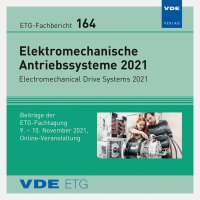Increasing the power density of induction machines by carbon based conductors
Konferenz: Elektromechanische Antriebssysteme – Electromechanical Drive Systems 2021 - ETG-Fachtagung
09.11.2021 - 10.11.2021 in Online
Tagungsband: ETG-Fb. 164: Elektromechanische Antriebssysteme 2021
Seiten: 7Sprache: EnglischTyp: PDF
Persönliche VDE-Mitglieder erhalten auf diesen Artikel 10% Rabatt
Autoren:
Sag, Robert (Robert Bosch GmbH, Corporate Research, Renningen, Germany & Institute of Energy and Automation, Chair of Electrical Drives, TU Berlin, Berlin, Germany)
Vollmer, Uwe; Koehne, Martin (Robert Bosch GmbH, Corporate Research, Renningen, Germany)
Schaefer, Uwe (Institute of Energy and Automation, Chair of Electrical Drives, TU Berlin, Berlin, Germany)
Inhalt:
Carbon-based conductors (CBCs) have the potential to overcome the physical properties of conventional metallic conductor materials and hence improve the key performance indicators of electric machines such as power (torque) density and efficiency. In comparison to copper, CBCs feature lower mass density, higher electrical conductivity and extremely high thermal conductivity. In this article differences between analytically optimized machines for copper and CBCs are highlighted, giving a first insight in optimal design of induction machines with CBCs. Depending on the final conductivity of CBCs, optimized designs show improvements of between 29% and 114% in power density when compared to copper optimised machines.


